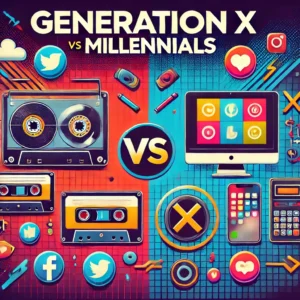Life Style
Why Gen Y Is Called Millennials: Understanding the Origins and Meaning
Have you ever wondered why Generation Y is more commonly referred to as “Millennials”? The term has become so ubiquitous that many people use it without a second thought. However, the story behind this label is both fascinating and reflective of a generation shaped by unique cultural, technological, and societal changes. In this article, we’ll explore why Gen Y earned the nickname Millennials, the origins of the term, and what it says about this cohort of individuals born roughly between 1981 and 1996.
The Origins of “Generation Y”
Before diving into the term “Millennials,” it’s essential to understand the origins of “Generation Y.” This generation follows Generation X, which includes those born between the early 1960s and late 1970s. Naturally, the next cohort was initially dubbed “Generation Y” to signify its chronological placement after Gen X. However, as time went on, this name didn’t fully capture the distinct characteristics and defining events that shaped the lives of those in this group.
Coining the Term “Millennials”
The term “Millennials” was popularized by authors William Strauss and Neil Howe in their 1991 book Generations: The History of America’s Future, 1584 to 2069. The authors chose this name because the generation was coming of age around the turn of the millennium. Those born in the early 1980s were entering their teenage years, while younger members of the cohort were still children as the year 2000 approached. The timing of their formative years aligned perfectly with this significant cultural and historical milestone.
Moreover, “Millennials” was a fitting term to encapsulate the sense of optimism, change, and technological advancement that characterized the era. The late 1990s and early 2000s were marked by rapid technological innovation, globalization, and a sense of possibility for the future—themes that resonated with this generation.
The Influence of Technology and the Internet
One of the defining characteristics of Millennials is their relationship with technology. Unlike previous generations, Millennials grew up during a time when the internet, personal computers, and mobile phones were becoming mainstream. This unique exposure to technology from an early age set them apart from Generation X and played a significant role in shaping their values, communication styles, and lifestyles.
Because Millennials were the first generation to come of age with the internet, they are often referred to as “digital natives.” This distinction further solidified the idea that this cohort deserved a unique name beyond “Generation Y.”
Cultural Shifts Around the Millennium
The turn of the millennium was more than just a numerical milestone; it represented a cultural and societal shift. As Millennials grew up, they witnessed and participated in significant changes, including:
- The rise of social media platforms like Facebook, Twitter, and Instagram, which transformed how people communicate and connect.
- Globalization, which brought diverse cultures, ideas, and opportunities closer together.
- Major political and economic events, such as 9/11, the Great Recession, and the election of Barack Obama as the first African American president.
These experiences shaped Millennials’ worldviews, making them more adaptable, socially conscious, and open to diversity compared to previous generations. The term “Millennials” reflects not only their connection to the year 2000 but also their role as agents of change during a pivotal period in history.
The Millennial Stereotypes: Are They Accurate?
The label “Millennials” has come to carry a variety of stereotypes—some positive, others not so much. On one hand, Millennials are often praised for being tech-savvy, entrepreneurial, and socially aware. On the other hand, they’ve been criticized for being entitled, overly reliant on technology, and prone to job-hopping.
While these generalizations don’t apply to everyone in the cohort, they stem from observable trends. For instance, Millennials’ affinity for technology has led to a strong presence in industries like tech, marketing, and creative fields. Their desire for meaningful work and work-life balance has also redefined traditional career paths.

Why “Millennials” Resonates More Than “Gen Y”
So, why did “Millennials” ultimately stick as the defining label for Generation Y? Several factors contributed to its widespread adoption:
- Cultural Significance: The term “Millennials” ties the generation to a transformative period in history, making it more meaningful than the generic label “Gen Y.”
- Marketing Appeal: “Millennials” has a catchier, more marketable ring to it, which helped it gain traction in media, advertising, and popular culture.
- Distinct Identity: Millennials’ unique experiences, from growing up with the internet to navigating a post-recession job market, set them apart from both Gen X and Gen Z. The term “Millennials” encapsulates these differences.
How Millennials Have Redefined Society
As the largest generation in the workforce today, Millennials have had a profound impact on various aspects of society, including:
- Workplace Culture: Millennials have pushed for greater flexibility, inclusivity, and purpose-driven work environments. Their influence has led to the rise of remote work, diversity initiatives, and mental health awareness in the workplace.
- Consumer Behavior: Millennials prioritize experiences over material possessions, favoring travel, dining, and entertainment over traditional markers of success like homeownership. This shift has reshaped industries ranging from retail to real estate.
- Social and Political Activism: With their strong sense of social justice, Millennials have been at the forefront of movements advocating for climate change action, racial equality, and LGBTQ+ rights.
Conclusion: A Generation Defined by Change
The name “Millennials” perfectly captures the spirit of a generation that came of age during a time of unprecedented change. From their connection to the turn of the millennium to their role as digital pioneers, Millennials have left an indelible mark on the world. While the term “Generation Y” may have been their original label, “Millennials” better reflects their unique identity and the transformative era they represent.
As we continue to understand and appreciate the contributions of this generation, it’s clear that Millennials have helped shape the modern world in ways that will be felt for generations to come.






